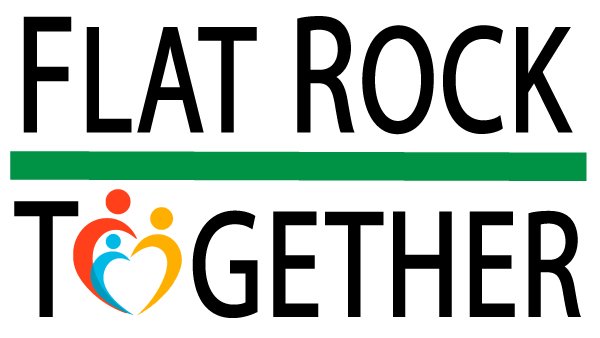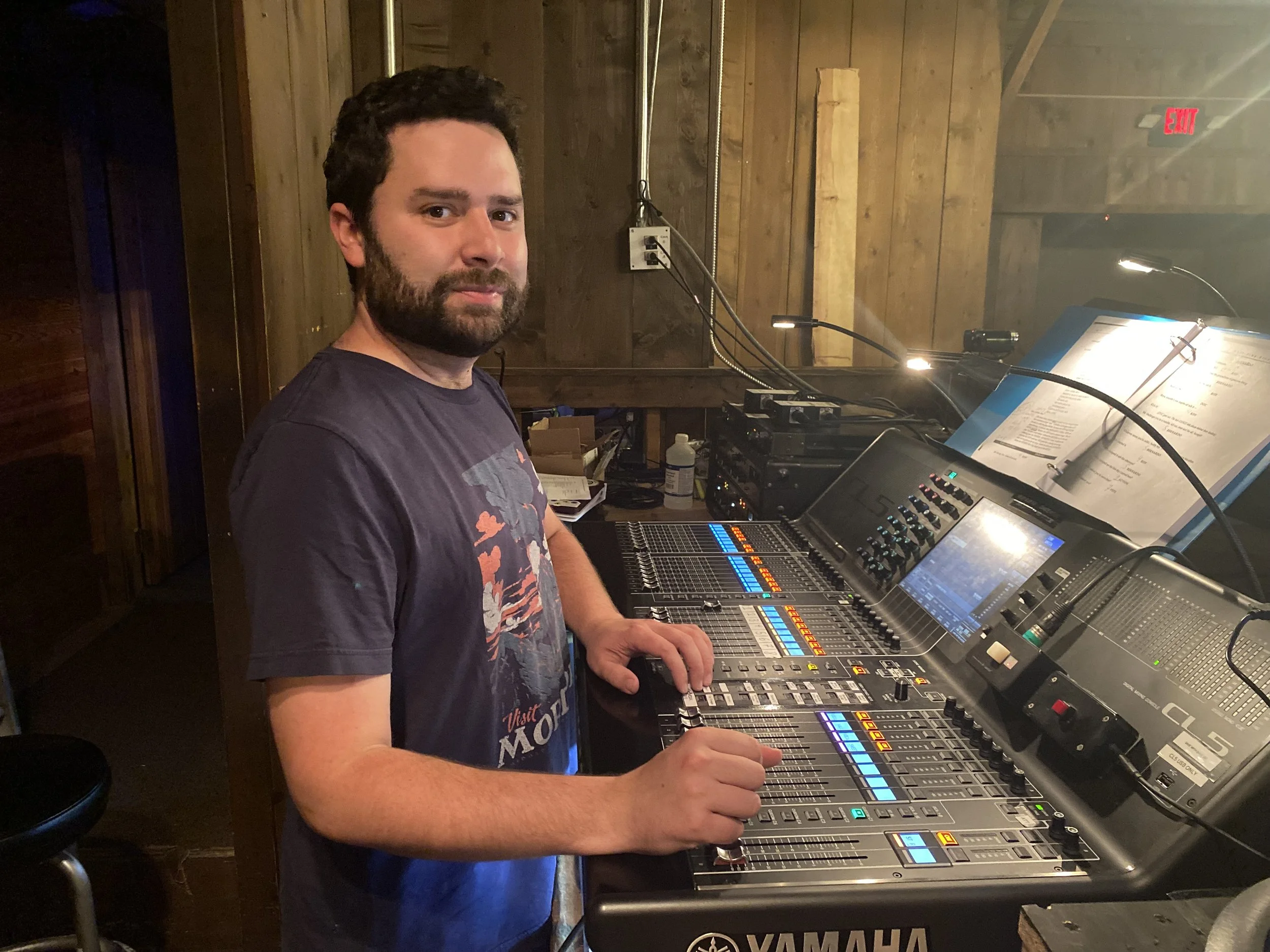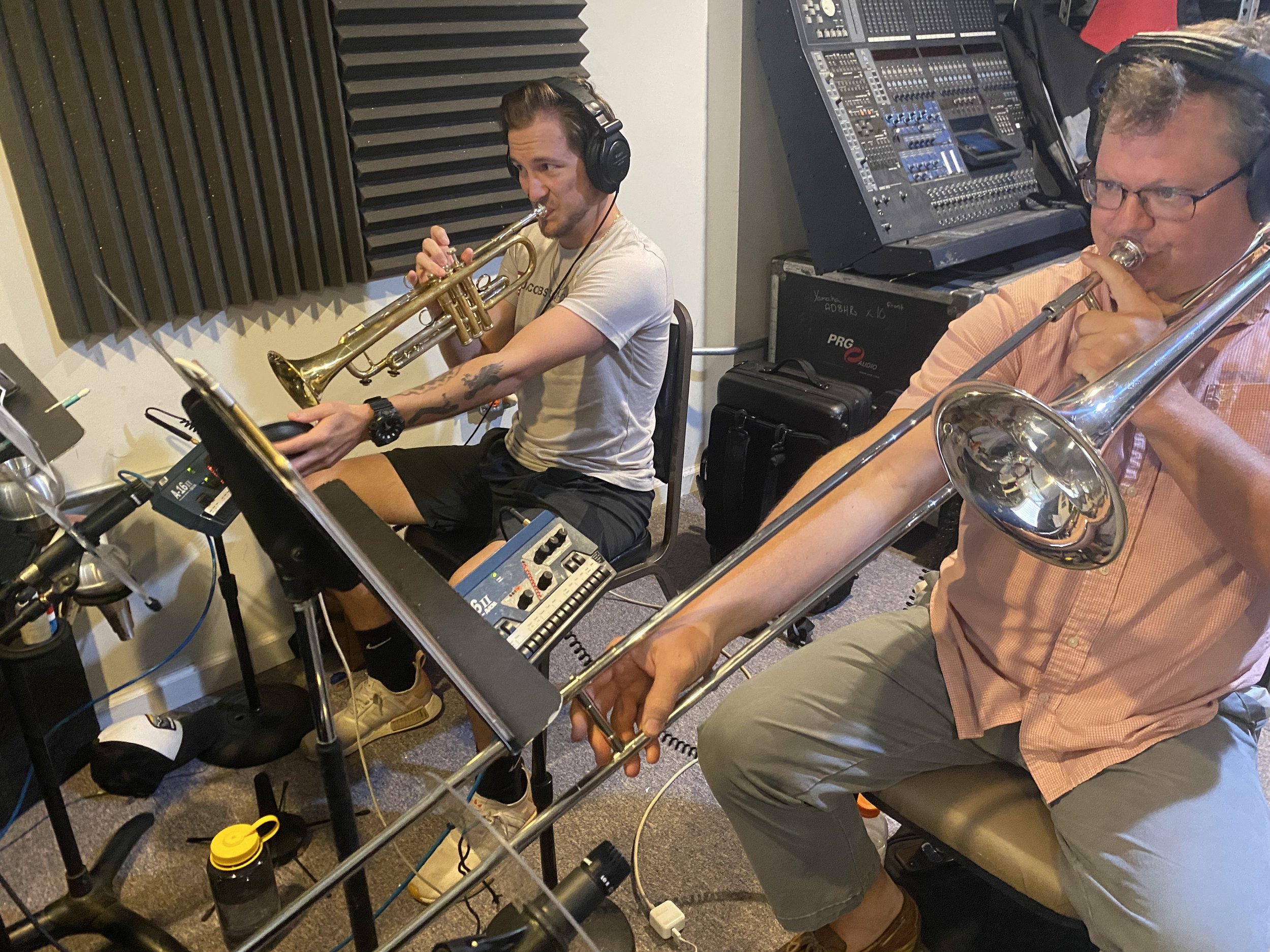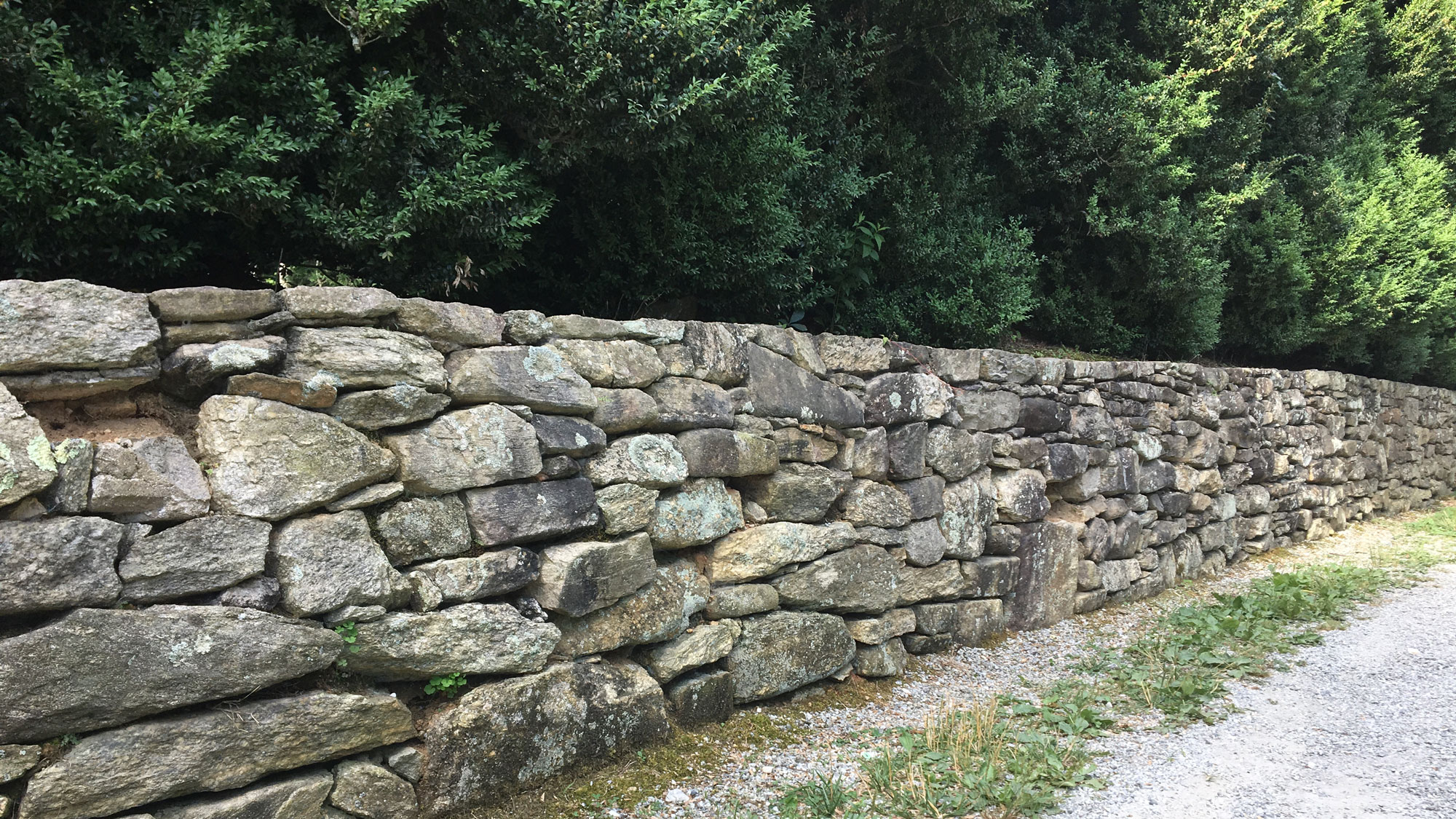Flat Rock's Unseen Musical Magicians
/The Band Loft at Flat Rock playhouse
At the conclusion of every Flat Rock Playhouse musical, the actors will take their bows and bask in the accolades of another appreciative audience. Then they turn and point to the upper left of the stage. Many patrons will not understand the meaning of this unusual gesture. But located high above the stage in a compact room known as the band loft, a small but highly talented ensemble of musicians will know that they have made another magical night of musical theatre at FRP a reality.
Indeed, the musicians at FRP may be unseen, but they are invaluable to the success of every musical production.
--
Tucked away in a room that was formerly costume storage, the FRP band loft is a long and narrow space directly above and slightly to the left of Leiman Mainstage. At the front of the room, Music Director Ethan Andersen sits at his keyboard and conducts a small but versatile band typically consisting of 6 to 8 musicians.
From their location in the loft, Ethan and his bandmates can only see the stage on small TV monitors. They also never hear exactly what the patrons sitting in the theater are hearing. The actual music in the theater is controlled by FRP’s Head of Sound, Kurt Davis and his crew of sound engineers. “When we play,” explains Ethan, “We are basically giving Kurt the raw data and his team is finessing what the audience hears as the final product. It’s a very collaborative process.”
It is this team effort between very talented musicians and expert sound engineers that creates the music that propels the narrative of every musical. Music that provides, the emotional, evocative, and uniquely energizing undercurrent for every great performance.
To get to opening night with everything prepared and perfected, however, is a process that is months in the making. “Believe me. We’re not showing up on opening night, opening our charts for the first time, and giving it a go,” says Ethan with a laugh.
Indeed, the process of making great music at FRP is as far from “giving it a go” as one could possibly imagine.
--
The Evolution of Musicals at FRP
Andy Preston on Upright Bass
Musicals have not always been a staple of each Playhouse season. In fact, it was 35 years after FRP held its first performance in a circus tent on The Rock before the Vagabonds attempted a large-scale musical production. Led by Artistic Director Robin Farquhar’s commitment to staging musicals and under the direction of long-time Musical Director George Wilkins, the Playhouse presented 1776: The Musical in 1987. As Dennis Mauldin long-time set designer and Playhouse historian explains, that production was a major turning point for FRP “from the old to the new.”
By today’s standards for musicals at the Playhouse, that 1987 production and musicals in subsequent years were modest by comparison. Wilkins frequently spent winters laying down pre-recorded tracks for upcoming musicals that were then supplemented with just a few live musicians – often a base player, someone on drums, and George on his keyboard. There was not a band loft at the time, so the live musicians were typically sequestered in the backstage wings on either side of the main stage.
Although a modest production by the standards of today’s Playhouse, the advent of musicals at FRP was well received by audiences. As Dennis Maulden recalls:
“Instead of the seasoned musicians and sophisticated sequencing of current orchestras, Robin assembled a small group of young people for the musical ensemble. Nevertheless, the seeds of enthusiasm had been planted, not only for the audience but also for the staff.”
Scott Treadway, another longtime Vagabond and FRP’s Company Manager, believes that Robin Farquhar would be pleased by the advances. “In the old days, Robin would do everything he could to help tweak a piecemeal sound system, but it was always a struggle. With all our new technology, I know he would be thrilled.”
The next step forward came under the Artistic Directorship of Vincent Marini beginning in 2009. Marini hired larger bands and worked to upgrade the technology needed to produce richer and fuller sounds required by blockbuster musicals. Bands were as large as 18 pieces and a new standard was set for what FRP audiences could expect to see and hear. But large bands and cutting-edge technology are expensive and FRP was soon facing the reality of trying the balance great sound with the available budget.
The need to evolve FRP’s musical offerings was first driven by financial realities and then exacerbated by the pandemic of 2020. With the hiring of Ethan Andersen as Resident Music Director in 2022, FRP entered the next iteration of its musical productions.
Ethan arrived at FRP as an apprentice in 2012 while still a student studying musical theatre at Elon University. He was an apprentice for two seasons and following graduation, he was hired by Marini as a Music Associate in 2014. He eventually went on to spend eight years in NYC but never lost his fondness and passion for the Playhouse. “I told them, ‘If you ever need a Resident Music Director again, please let me know’”. The Playhouse did and Ethan was hired to the full-time staff in 2022.
Ethan Andersen, FRP Music Director, at his keyboard in the band loft
The Process
The process for assembling the music for each season begins months before the curtain goes up on the first mainstage performance. The season is typically selected in the fall/winter of the prior year by FRP Artistic Director Lisa Bryant. She sends the list of shows to Ethan and he gets to work immediately. “For many Broadway shows, the original orchestration is typically arranged for 16 – 25 players,” Ethan explains. Then he adds with a smile, “Even if we had an unlimited budget, we wouldn't have the space for that many musicians.”
Ethan then spends the next several months re-orchestrating the music for a much smaller ensemble – usually just 6 - 8 musicians. His challenge is to get a “Broadway sound” with his much smaller band. Far from being deterred, he enjoys the challenge. “I think about how can I achieve the full sound with fewer people. I enjoy that. It is a fun puzzle.”
The reorchestration is a very time-consuming process. It involves Ethan entering every note of every song of every show for the upcoming season into his notation software to generate new sheet music that is tailored to his specific ensemble. “That way my musicians are working from a clean score that doesn’t look like a Frankenstein cut to pieces.” The reorchestration typically takes Ethan from November to February.
As the reorchestration process is going on, Ethan is also booking musicians for the new season’s shows month in advance. “We hire from a pool of the best musicians in the area. They are typically booked pretty far out, So I have to get on their calendars early.”
The end result is a custom orchestration with some of the region’s most accomplished musicians. Ethan’s objective is to create a unique and cohesive sound that feels orchestral and lush. “I like to say Flat Rock Playhouse audiences are receiving tailor -made orchestrations for every show we do.”
The Musicians
Paul Babelay on Drums
The musicians hired by Ethan and the Playhouse are typically local or regional players from western North Carolina and Upstate South Carolina. They tend to be very experienced and versatile in terms of the skills they bring to the orchestra.
Percussionist Paul Babelay has been playing with the Playhouse for 32 years, performing in approximately 160 shows, and is frequently the foundation of any ensemble put together by Ethan. Paul, age 62, lives in Fairview and is an adjunct faculty member of the Music Department at Montreat College. He is also part of a Beatles tribute band called Here Comes the Sun, among a host of other musical accomplishments and accolades. His first gig with FRP was in 1992 for a production of Gilligan which featured FRP favorite, Scott Treadway, in the lead role.
Paul particularly appreciates the work put in by Ethan to prep for each show. “Ethan is great. He will take a score and arrange it himself and so five or six people are up there getting all that sound. That throws a lot of a lot of weight on each musician, but he finds the people that can pull it off.”
Andy Preston, bass player, taught orchestra in Columbia, South Carolina for 30 years. On weekends he sat in with local bands to play bass and he was very active in the theater scene. He now lives in Leicester and enjoys the opportunity to play – and continue to improve - his craft at FRP where he has been playing for over 20 seasons. “Playing with people who are at such a high level brings out the best in my playing. I play my best when I'm playing with people who are as good as me if not better.” He’s also a big fan of Ethan. “He is the most talented person I've ever worked with at any age. I've worked with some people who were very good, but Ethan is just the consummate musician, conductor, and piano player. He’s fun to work with.”
Misty Rondeau
Misty Rondeau, on woodwinds, is a prime example of how versatile each musician must be when there are only 6 – 8 musicians replicating the sound of a 16-piece band. For this season’s performance of Cabaret, she arrives at the band loft with a clarinet, flute, and two saxophones – and is called upon to use all of them during the performance of Cabaret. “It's usually one instrument per song because that instrument is tied to a character perhaps or a particular mood. But for Cabaret, there are a couple of numbers where I actually cycle between all four instruments.”
Misty is a professor at Mars Hill University and has toured around the country with her ensemble, FUJIN. She has also released two albums. And she loves to share her virtuosity at the Playhouse. For all her accolades, Misty believes the quality of the musicians and the performances at Flat Rock Playhouse help her continue to improve. “There are definitely aspects of my playing that have gotten better because of the depth of things that we do at the Playhouse. And it helps to be surrounded by such talented musicians.”
Ethan is understandably proud of his musical team. “We are committed to providing quality live musical entertainment with excellent local musicians. We're not flying in musicians from New York City.”
The Band Loft
The Band Loft at FRP is a compact room with cables, microphones, monitors, and computer screens liberally scattered throughout the space. What it lacks in size and number of musicians, it makes up for with technology.
Controlling everything is Ethan at his keyboard at the front of the room. He has two monitors that allow him to see the stage at all times – including one that uses infrared light so that he can see the darkened stage during scene changes to know when actors are in place and ready to start. His headphones allow him to hear the stage manager who is sequestered in a small control room at the back of the auditorium as well as the sound board operator. He also has a mic that allows him to speak to the musicians through their headphones throughout the course of the production.
Ethan is also on camera so that actors on the stage can see him on two monitors that are directly in front of the stage and suspended above the audience. The actors will watch the monitors for cues from Ethan at the start and hard stops of musical numbers. In a traditional pit orchestra, musicians can watch the baton of the conductor for their cues. Since Ethan is playing his keyboard and the actors can only see his head and shoulders, he needs to be very physically animated as he plays and conducts – especially with his head and facial expressions. “My conducting is more head-ography than baton-ography,’ he says with a laugh.
Kurt Davis, FRP Head of Sound
The musicians may have several mics depending on the number of instruments they play and the particular sounds Ethan and Kurt most closely want to monitor. The acoustic instruments – horns, woodwinds, percussion – are all individually mic’d. Electronic instruments – keyboard, electric guitar, electric bass - have a direct feed to the sound board and do not use mics. An observer in the loft without headphones would only hear the acoustic instruments. Meanwhile, the electric bass player and Ethan on keyboards appear as if they are silently pantomiming their performances.
What the musicians hear in their headphones, however, is a different story. Each musician has their own Aviom monitor mixer that allows them to dial up or down their music and the music from each of the other musicians as well as the actors on stage. This control allows the musicians to hear the parts of the production that are most advantageous to their performance. “Each musician has complete control of what they want to hear,” explains Ethan.
Ironically, the only people in the Playhouse who don’t hear the “final” musical presentation are the musicians themselves. While they are playing, the sound technicians are modulating the music coming from the band loft to optimize the listening experience for the audience. Which entails a lot of trust in Kurt Davis and his team on the part of Ethan. “I can explain to Kurt what my vision for the music is, but ultimately the sound design is up to him.”
For his part, Kurt has a strong musical background combined with the technical expertise that provides the skills necessary to optimize the music. He is a musician himself and he understands and appreciates what Ethan needs and wants. “Ethan and I have a good understanding of how each other’s job works, so we can communicate clearly.” He also adds that “the musicians Ethan brings in are top-notch and always good people to work with.” For Cabaret, Kurt’s sound crew also consists of Mason Sams, Audio Engineer, and Rachel Peterkin, Microphone Technician.
--
How do the musicians feel about being sequestered in a small room out of sight of the audience they are entertaining? As with most situations, there are pros and cons to the setup. On a positive note (pun intended), the sound quality can be carefully monitored and controlled by the sound engineers. This allows Ethan and Kurt to highlight the instruments most important in any song and marry the band with the vocalists on the stage below. The musicians can play in a manner that is most comfortable – Paul on drums for example can really dig into his riffs – without fielding requests to play louder or softer.
John Grodrian on trombone and Max Kinard playing trumpet
A second positive feature of the loft is the casual feeling of the room. Because they are out of sight of the audience, the musicians are not subject to dress codes and do not have to restrict their movements to avoid distracting from the action on the stage. During the breaks between songs, they can take a drink, get a snack, or even read a book without distracting the audience. “That’s nice in a musical like Cabaret where there may be longer scenes without music,” says Ethan.
On the downside of the arrangement (again, pun intended), the musicians are removed from the action and the energy created when playing before an audience. Says Ethan, “There is nothing like receiving energy from the audience.” The band loft also makes it more challenging for Ethan to cue the actors as songs begin or end. Although they can see him on the monitors suspended above the audience, cues are not as obvious as they might be from a conductor standing in the orchestra pit at the front of the stage.
A frequent question for both actors and musicians performing the same show dozens of times is the issue of repetition fatigue. At FRP, however, the show runs are not typically so long as to create a problem. “Opening weekend is filled with adrenaline, and by the second week, we start to feel more comfortable and relaxed,’ says Ethan. “So it’s not fatigue, but comfort that we have to fight. It’s important we continue to remain present and focused as the run continues.”
Finale
After months of preparation, practice, and attention to minute detail, FRP’s talented musicians close themselves in a small room and perform, sight unseen by the audience enjoying their music. But they are consoled by the fact that they know they have been part of excellence unique to FRP.
Regarding the patrons who don’t realize they are listening to live music, FRP’s musicians have come to terms with a certain level of anonymity. “In one sense, it is a compliment when they don’t realize it is live music. If they don't think about us, that means we're doing our job,” says Ethan with a smile.
In Paul Babelay’s case, his anonymity is actually harder on his wife. “My wife has had gentle arguments with people in the audience who don’t believe it is live music for 30 years,” he says with a laugh. “I kind of gave it up years ago. It doesn't hurt my feelings.”
For Andy Preston, regardless of the lack of recognition, he is proud to be part of FRP’s decades of success. “I tell people who have never been to the Playhouse that they have no idea what they're missing. All aspects of the performances are incredibly high level.”
Ultimately, the Playhouse musicians provide an authenticity of theatrical experience that will never be matched by recorded music. “What we have to offer is a unique, live, and catered only to you in this moment experience,” says Ethan.
In the end, the reward for Ethan and his musicians is the enthusiastic response to each performance. Their role in that success may not be as obvious as the actors, but they appreciate the applause just as much. “For the audience to have even a glimmer of appreciation for the months of work that come before the performance, is rewarding. When we hear the applause through our headphones, we understand that they are applauding for us as well.”
So, if your plans are to attend Cabaret or any future musicals at the Playhouse, be sure to remember the musicians in the band loft behind the stage - the unseen musical magicians of Flat Rock Playhouse.


















